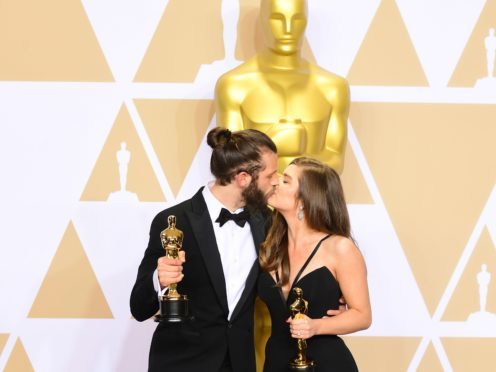British Oscar winners Rachel Shenton and Chris Overton have described the “surreal” moment their film, which stars a six-year-old deaf girl, scooped an Academy Award.
The pair won best live action short film for The Silent Child.
Young actress Maisie Sly, who is deaf, plays Libby, who lives in a world of silence until a social worker teaches her the gift of communication.
Sly auditioned for the role after her parents replied to a post on Facebook, appealing for a deaf child who communicates entirely through sign language.
Shenton, 30, a former Hollyoaks actress, wrote, produced and starred in the film.
Let’s celebrate diversity. Disability is Diversity.Retweet this or even better, take a picture like Maisie #TheSilentChildOscars90 pic.twitter.com/ySrK9yVruM
— The Silent Child (@SilentChildFilm) February 8, 2018
Shenton told Good Morning Britain: “It’s a really surreal moment. We felt really calm beforehand….
“Two categories before ours we felt, ‘Oh God, this is really happening. This is awful’.
“And then, as the names are called out, we heard The Silent Child and thought, ‘Oh my God that’s actually us, it’s not nominations, we’ve won.’ It’s so surreal.”

Shenton wrote the film after becoming passionate about the issue when her father became deaf when she was young.
Collecting the prize, Shenton delivered her speech in sign language saying: “I made a promise to our six-year-old lead actress that I’d sign this speech.”
And she added: “My hands are shaking so I apologise.”
Later, she hailed the young British actress as “a star”.
“She did the red carpet with us and then sat with her mum,” Shenton said.
“I didn’t want her to not look at me and look at the interpreter. I made a promise and I kept it even though I was a bit shaky,” she said of her winner’s speech.
The short film is now in over 600 cinemas in the US.
“The message is super important, raising the profile of deafness. There are so many deaf children. It’s a subject that hasn’t been talked about,” Shenton said.
Overton – who is engaged to Shenton – directed the film.
“It’s mindblowing. What a woman. I’m such a lucky man I really am,” he said.
While Shenton joked of her fiance: “He’s all right.”
And the Oscar goes to… pic.twitter.com/EdW97Bk1w9
— The Academy (@TheAcademy) March 5, 2018
The British soap stars are best known for playing Mitzeee Minniver and Liam McAllister in the Channel 4 show Hollyoaks.
They fended off competition from short films DeKalb Elementary, The Eleven O’Clock, My Nephew Emmett, Watu Wote/All Of Us at the glittering ceremony.
On receiving her award, Shenton had said: “Our movie is about a deaf child being born into a world of silence.
“It’s not exaggerated or sensationalised for the movie, this is happening, millions of children all over the world live in silence and face communication barriers and particularly access to education.
“Deafness is a silent disability, I want to say the biggest of thank yous to the Academy for allowing us to put this in front of a mainstream audience.”
Susan Daniels, chief executive of the National Deaf Children’s Society, said the Oscar win was an “incredible achievement”.
She said: “For deaf children across the globe, this film, its story, and its talented leading lady all show there is no limit to what deaf children can achieve.
“But more than that, The Silent Child shines a light on the challenges and injustices that too many deaf children experience as part of their daily lives. From issues with access to language or the means to communicate, to being let down and left behind in education, so many of the themes shown in this powerful short film are all too real for too many deaf children.”
She added: “Above all else, this film and the Oscar it has won show that when society, family and government reach out to support deaf children, there is nothing they cannot achieve.”
